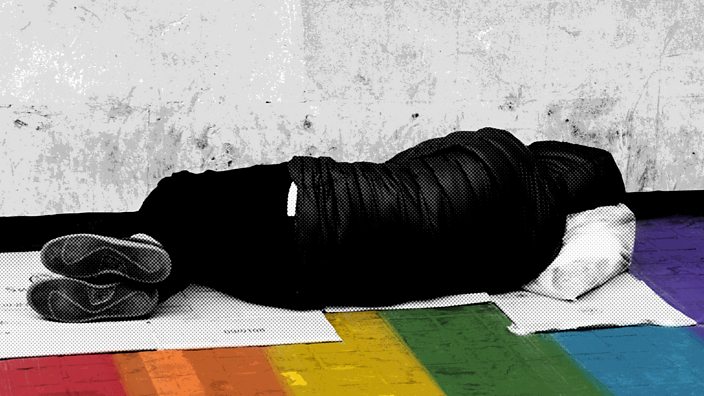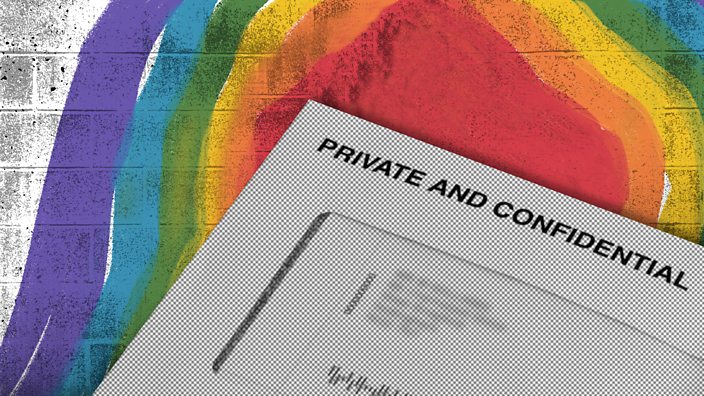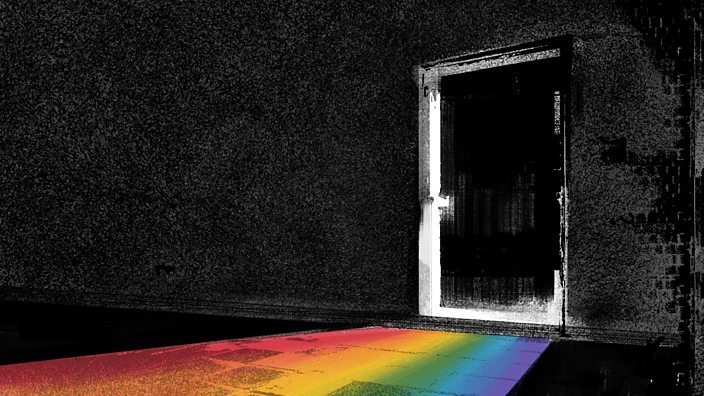BBC Investigation Of LGBT Homeless Teens Across England
by Hannah Price
A BBC Three investigation has found that some local councils across England are asking young LGBT people who have been forced to leave home to obtain letters from their parents as "proof" that they're homeless.
Saskia* was 15 when she perched on the edge of her parents' bed and told her mum, who was suffering from terminal cancer, that she wanted a sex change. She didn't yet know the word "transgender".
"I needed to tell her before she went," Saskia recalls.
Through the haze of illness, her mum hugged her. She died a few days later.
A year later, she told her dad, and his reaction couldn't have been more different.
He shouted a homophobic slur at her, she says, and put his hands around her throat.
When he wasn't being violent, Saskia says her dad would emotionally abuse her by talking angrily about how her transition would tear the family apart. Saskia's sibling messaged her, saying: "I wish you died instead of mum."
Eventually, after an explosive argument with her dad, where she was told she was no longer welcome at home, Saskia left the house to stay with a friend's family.
"It was a very strange, scary night. I kept waking up not knowing where I was or what was going to happen to me," she says.
It didn't hit Saskia that she was homeless until a few days later. The items she had quickly scooped up into a bag were all she had now.
'I couldn't get a letter so I was left homeless'
The Albert Kennedy Trust, an LGBT youth homeless charity, estimates that one quarter of all homeless people under the age of 25 are LGBT and found that 69% of them have experienced familial rejection, abuse and violence.
When Saskia contacted Cornwall Council for help, she says they asked her to obtain a letter from her dad to prove she had been kicked out.
"Obviously I couldn't message my dad to ask for it, I was just terrified of being in the same place as him.
"I was trying to contact my family to try and get it [but] they just weren't cooperating.
"The council basically said without evidence there was nothing they could do."
As a result Saskia says she was left sofa surfing for months, at 16.
"It was really terrifying to be waking up in a different place and finding out at school who I'm sleeping with that night, when I’d next be moving my stuff and not knowing if I was going to eat that day."
BBC Three contacted all 343 local councils in England and found that Saskia is not alone in her experience — 55 are asking young LGBT people who have been told to leave home for letters from their parents as “proof" of homelessness, unless there are claims of abuse.
The BBC has spoken to several people under the age of 25 that had to leave home because of their sexuality or gender identity and who say they are unable to obtain a letter from their parents or guardians. They say their local council is not supporting them as a result - because the council either does not believe that they are homeless or is labelling them as "intentionally homeless".
Some have been asked for letters even after they told the council they are victims of domestic abuse by their parents.
Of the 175 councils that responded to our questions only four said they never contact LGBT people's parents for proof that they've asked their child to leave home.
Leading charities say the system is putting homeless LGBT young people at risk.
The Local Government Association said that because of "unprecedented funding pressures", they are becoming "increasingly limited in what they can do". They also said that more than two thirds of council homelessness services are now being "forced" to spend more than they budgeted for on homelessness.
Leigh Fontaine, services manager at The Albert Kennedy Trust, sees "proof" letter requests all the time.
"A lot of the time parents will say one thing to the local authority — 'Oh, no. I've not kicked my son or my daughter out' — but in the same instance they are telling the child they can't return home. I don't think that local authorities always take homophobic abuse in the home seriously."
Nic Nichol, a housing barrister who has represented homeless clients for over 30 years, said: "There is a general societal problem of straight people — council officers — not understanding the degree to which being LGBT renders a person vulnerable."
After being contacted about Saskia's experience, a spokesperson for Cornwall Council said: "The experience of the young person highlighted in your report is not one we would want or expect for any homeless young person coming to us for help.
"We're committed to treating everyone who approaches us for help and advice with respect and in line with our homelessness protocols. Any 16 or 17 year old coming to us for help with housing will, if homeless, automatically be considered to be in priority need.
"In situations involving young people and where there has not been an allegation of abuse, we will contact the parents to establish the home situation and offer mediation if appropriate. Our aim is to keep families together, but in situations where this is not possible we will arrange alternative temporary accommodation."
The spokesperson denied that Cornwall Council asks for letters to prove if a young person is homeless but confirmed they do contact parents directly if there has not been an allegation of abuse.
'I felt like the council was against me'
Like Saskia, Reggie* found himself homeless at a young age.
When he was 13, Reggie wrote a love note to the boy he fancied and sometimes sat next to on the school bus. No-one was ever supposed to read it but after accidentally leaving it at home, his mum found it.
"The breakdown of our entire relationship happened over one afternoon," he says. "The next three years were like living in hell, it was really bad."
Reggie says that his mum kicked him out when he turned 16 because he was gay and she was no longer receiving child benefit for him.
When he approached his local council he says he was asked to provide a letter from his mum as proof he was homeless.
"I felt that the council were against me, as much against me as my own family, and I felt like I didn't have anywhere to turn."
He says he resorted to rough sleeping and other ways of surviving: "I've used apps and dating websites to be able to find somewhere to stay for the night if I'm desperate. I've felt like I had to have sex with the person I was staying with to be able to stay there."
He eventually sought shelter at a youth hostel, where he made the decision to go back into the closet, for his own safety.
"Being in a space like that was toxic for me because I felt like I couldn't be out — I felt like, if anyone did find out I was gay, something terrible would happen to me," Reggie remembers.
He describes the hostel as full of "casual homophobia, and casual racism… there was no other black person there, I'd overhear many racist jokes or jokes about gay people."
What support is there?
In 2017, homelessness activist Carla Ecola founded The Outside Project — the UK's first ever LGBT homeless shelter exclusively for the community. Carla experienced being homeless, and found there was no specific provision for LGBT people: "You don't really feel you belong in [existing] services or that they would really understand your needs, or that it's actually safe for you.
"Genuine solidarity would be an actual service delivery, funding bed spaces, making reforms in your councils to be able to support our community properly."
A spokesperson for the Ministry of Housing, Communities and Local Government said: "This Government recognises that homelessness amongst LGBT people is an important issue and is determined to understand it better. That's why we are currently undertaking research drawing on people's experience.
"We are also funding bespoke training for frontline staff to support those identifying as LGBT and our findings from this and the research will help us to ensure we are meeting the needs of these individuals."
The BBC understands the training was voluntary and is due to finish this month - only nine, of the 175 local councils that responded, confirmed they have had specialist LGBT homelessness training.
The spokesperson added that in 2020/2021 they are providing £437 million to tackle homelessness and rough sleeping and that councils have used this funding to create an estimated 2,600 more bed spaces and 750 additional specialist support staff this year.
But Helen Hayes, Labour MP for Dulwich and West Norwood, says: "These findings are shocking and point to a basic failure to understand the needs of LGBT people facing homelessness and to offer appropriate support and protection. The government should take these findings very seriously and introduce mandatory training for all frontline staff working in homelessness, with the funding to ensure that councils can implement it."
Saskia is living in university accommodation now, but says she's still fearful for her future: "If I don't get a job straight out of uni, I know I'm going to be homeless again.
"I feel like if I ended up on the streets — I couldn’t go out there another time, I don’t think I’d be able to survive it again. I barely survived it the first time."
*Names have been changed to protect anonymity.




Comments